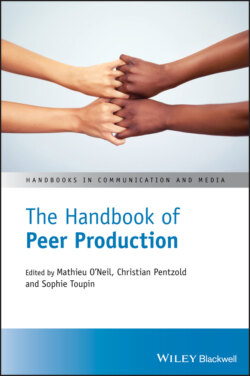Читать книгу The Handbook of Peer Production - Группа авторов - Страница 101
7 Conclusion
ОглавлениеThis chapter has sought to synthesize existing research with sociological theory in order to shed light on the cultures of peer production. Building on Bourdieu’s field theory, I have argued that attention to peer production as cultural production helps us to understand several key aspects of Wikipedia and open source communities. First, such projects do not exist in a vacuum, and their cultures are tied to notions of autonomy within a broader field of software and media production. Wikipedians enact a form of knowledge production that stands in contrast to certain bureaucratic and commercial practices that they perceive as unsatisfactory, if not “evil.” Likewise, Linux communities and other FOSS actors enact a more autonomous form of software production than, say, the commercial and proprietary operating systems produced by Apple and Microsoft. Second, the core values these projects embrace are related to the forms of reputation or symbolic capital that circulate within them, and this in turn creates hierarchies. Third, these values are enacted and maintained through various forms of socialization and a range of cultural practices from sharing code to sharing jokes. Meanwhile enactment of these values does not come without social costs and blind spots: in particular the belief in meritocracy and openness of these communities can lead to a blindness for inequalities that do exist. Fourth, drawing also on the work of Boltanski and Thévenot, as forms of cultural production these projects are notable for the importance of an affective charge: autonomous peer production projects require that participants feel connected to a larger common purpose.
Although this chapter has limited its focus to peer production in its more autonomous (and well‐known) forms of Wikipedia and open source software, the aim is that this framework will help readers map and analyze the cultures of other peer production projects. What larger cultural field are they situated in? To what degree do they appear to be independent or autonomous, and what kinds of companies or other actors would they distinguish themselves from? In what ways are hierarchies created among participants? What shared values do they have and how are they enacted? Most importantly, how do these various elements common to cultural production – a sense of autonomy, shared social norms, and hierarchies of symbolic power – interrelate?
In addition to benefiting analysis and research, understanding peer production through the framework of cultural production may benefit practitioners. In particular, it may help practitioners think through the problem of gender and racial inequality that endanger open source communities and Wikipedia by alienating new participants, in particular women. As many critics have argued and various researchers have shown, these projects often fail when it comes to living up to their professed liberal value of equality: seen in the framework offered here, what is happening is a classic dynamic of fields, namely a conservatism that favors existing power structures, including existing class and gender inequalities. As Bourdieu argues, determinations of cultural capital (i.e., what constitutes valuable traits, knowledge, or skills within a particular social context) and symbolic capital (i.e., acts of recognizing valuable work or contributions) are never neutral, and often serve to reproduce the power of a dominant class. This can be seen at the level of peer production projects as well, where for example Wikipedia’s culture – wrapped up as it is in the social norm of fiery debate, the celebration of technical skill and the lack of patience for new participants who don’t know or understand all the rules and policies in place – is incredibly unwelcoming for newcomers and in particular women.
Much the same can be said of many FOSS communities. These tendencies were notably nurtured in the early, male‐dominated development of these projects, and by naturalizing such “culture” and demanding that new volunteers adapt to it, these projects are now justifiably facing harsh criticism. The most critical voices would likely argue that the cultures of open source software and Wikipedia are rotten at the core, and this may be true. Despite this, seen in the framework of field theory, I would argue that we should also see some ambivalence here: peer production projects tend to have an inspired, passionate group who codify their shared identity and sense of autonomy in various cultural norms, guidelines, and practices. These projects, like any other form of social action, are not immune to hierarchy and the cultures of these projects will tend to favor those who are in power. However, the conservatism of upholding a project’s original values can arguably also be progressive, such as when Spanish Wikipedians forked the project in response to co‐founder Larry Sanger suggesting that Wikipedia would take on advertising (Tkacz, 2014). In doing so, these Wikipedians demonstrated how such a move would destroy the integrity of the project (both in the sense of its authenticity and unity), and thus successfully argued against it in line with a shared sense of the project’s purpose. Perhaps the question facing these communities is not how to replace their liberal values, social structures, and norms wholesale, but how to renew their sense of project autonomy as well as their corresponding cultures in line with an ethic of inclusivity and open‐mindedness.
